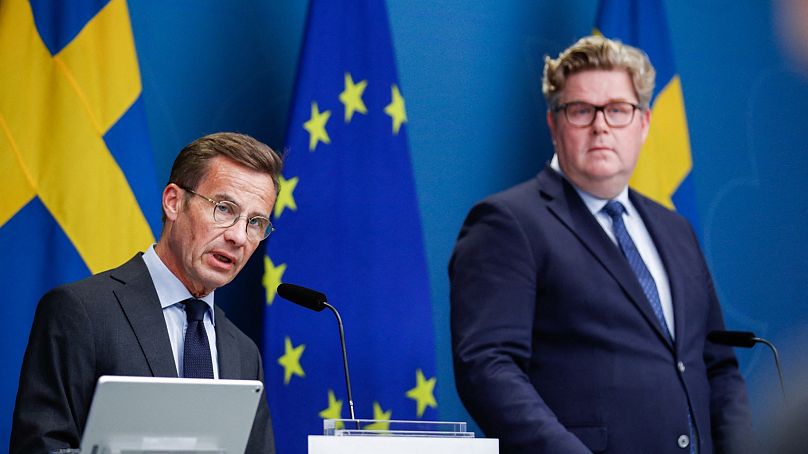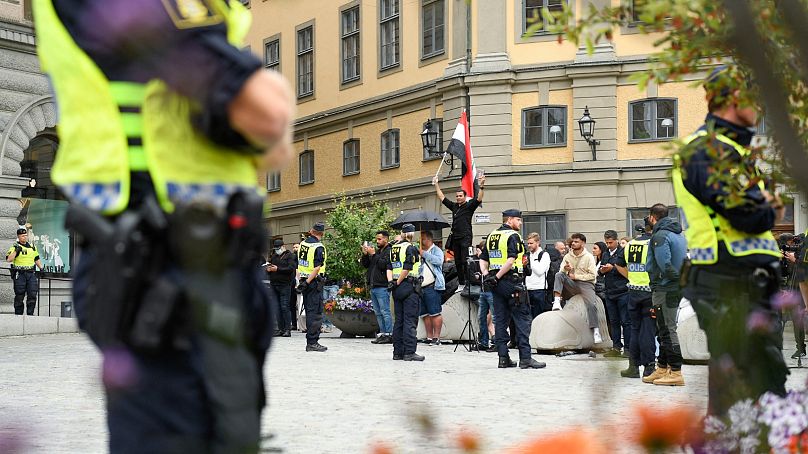A series of government-authorised protests have put questions of free speech and Swedish identity up for grabs, while the government warns national security is under threat.
The spectacle of Qurans being torn and burned at protests in Sweden has fuelled intense public debate at home – and by the standards of Swedish domestic affairs, the incidents at legal protests have kicked off a shockingly intense international furore.
 ADVERTISEMENT
ADVERTISEMENT
 ADVERTISEMENT
ADVERTISEMENT
Angry demonstrations have been seen in countries from Iraq to Indonesia with protesters furious not just at the burnings themselves but at the fact they have occurred at events for which the Swedish authorities gave permission. The 57-member Organisation for Islamic Co-operation has presented a 35-point action plan on the issue to the Secretary General of the UN.
The Swedish government – a right-wing coalition ruling via an arrangement with the far-right Sweden Democrats – is attempting to soothe its relations with these aggrieved governments, particularly Turkey, which had been blocking the Swedish accession to NATO.
And is also under pressure to take decisive action at home.
The government’s line is increasingly that both the Quran burnings themselves and the outrage over them are being fuelled by foreign agents provocateurs and disinformation efforts – including from Russia - which is enraged at the prospect of Sweden joining NATO.
It has also been reported that some Swedish residents have received suspicious text messages calling for “revenge” on those who have burned the Quran in public, though it is unclear whether they are more sinister than a phishing scam.
Ministers have so far ruled out amending Sweden’s freedom of speech law or banning Quran burnings outright, with Kristersson insisting that there is a place for responsibility as opposed to state restriction. “Everything that is legal is not appropriate,” he said at a press conference last week. “It can be awful but still lawful.”
Instead, as per Kristersson’s statements that the controversy is being stirred up by “outsiders” intent on undermining the country’s safety, border policing is being stepped up.
Starting this month, border guards are being given enhanced stop-and-search and electronic surveillance powers, a move that Justice Minister Gunnar Strömmer says will allow them “to identify people coming into Sweden who could represent a threat to security.”
The potential national security risk posed by the row is clearly severe. But also looming large is the question of what the Quran-burning saga means for Sweden’s civic identity – specifically, the core values of freedom of speech, openness and social equality.
The meaning of these values is hardly settled in Sweden. As in various other European democracies, different political tendencies take a different stance on where the balance lies between freedom of expression and social responsibility.
Earlier this year, ex-prime minister and Social Democrats leader Magdalena Andersson told national broadcaster SVT that those burning the Quran in protest are “useful idiots” doing an unwitting service to those seeking to divide Swedish society, and that they had a duty to consider the consequences of their actions.
But also at issue is the matter of where both immigrants and Muslims fit into Swedish society, a point that’s become more contentious in the last decade as the radical right has gathered steam.
Rage
The Sweden Democrats have staked out a position as an immigration-sceptical party claiming to stand up for traditional Swedish culture. The party is especially culturally dogmatic when it comes to Islam, which senior figures including leader Jimmie Åkesson have frequently suggested is incompatible with “Swedishness” and might be considered a threat to the integrity of Swedish society.
(As things stand, some 8% of the population of Sweden is thought to be Muslim.)
With ideas like these front and centre in its platform, the party has risen to become the second-largest in the Swedish parliament, and it is now sustaining the current coalition government via a confidence and supply agreement, meaning its voice in public debate is louder than ever.
Åkesson has not endorsed the burning of the Quran as a form of protest. Earlier this year, as the issue began to develop, he stressed that Sweden protects the right to burn the Quran, just as it protects the right to burn the Bible.
More aggressive, though, is his party colleague Richard Jomshof, chair of Riksdag’s Justice Committee. After at least a decade of notoriously harsh comments about Muslims, he tweeted last week that Islam is “an anti-democratic, violent and misogynistic religion/ideology”, describing the prophet Muhammad as “a warlord, mass murderer, slave trader and robber”.
These sorts of statements dovetail with the tone of more recent Quran-burning protests, which seem increasingly calibrated to keep the ongoing row as heated as possible.
In an incident this week at another government-authorised protest, two notorious protesters set fire to the book outside the Swedish parliament as counterprotesters chanted "Allahu Akbar". The men concerned are Iraqi nationals who have staged similar protests this year, saying they want the Quran banned in Sweden altogether.












